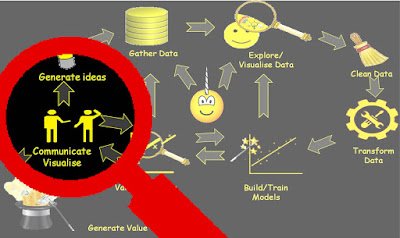HBR came up with an article
directed at people in the business: “Better questions to ask your data
scientists”(1).But is this the right approach?
As an analogy, when you go to the
see a doctor, do you think it makes more sense for the doctor to talk your
language or for you to speak in doctor-language (medical terms)?
By talking in plain language, the
doctor can uncover symptoms that you might not feel worth mentioning, that you
might not feel are important or related. Or do you know enough medicine to be
able to describe your symptoms properly and completely in medical terms?
I know I don’t know enough about
medicine, and even less about medical terms. Call me a chicken, but I’d rather
not get paracetamol/panadol for a headache that’s the beginning of a brain
tumour. ‘cluck!’
To me, a doctor consults with
you, the diagnosis is a collaborative process between 2 parties, but who
bridges the gap in terms of language makes a huge difference in the
outcome.
Would you rather be treated for
what you really have, or what you think you have?
Now, how does this relate to
“data science”?
I go back to the Drew Conway
definition of data science(2) which looks like this, but here the "data scientist" is shown as a unicorn:
A “data scientist” is someone
who, on top of hacking Skills/Computer Science and Mathematics/Statistics
skills has substantive domain knowledge. Basically, the “data scientist” should
be able to speak to the business in business language.
One of the things that I have
learnt while working with clients from various organisations and industries is
that, very often, the clients don’t mention issues they don’t think “data
science” can help them with. That’s not because these issues are not important
to them, but simply because they do not know that “data science” can help solve
them; they do not know what they do not know.
Similar to the case of getting an
accurate medical diagnosis that will help cure the underlying medical issues, I
believe that the data science process is in essence consultative. The best
outcomes are always from collaboration between the business and the “data
scientist”.
It is the role of the “data
scientist” to understand where the client is coming from, dig deeper, ask relevant
questions, know the data that is required to tackle these issues, and maximise
the benefits the client can get. For that, domain knowledge is critical. (And
of course that’s just a small part of the “data science” process.(3))
Furthermore, the interactions and
collaboration between the business and the “data science” are not limited to
the “initial diagnostics stage”, but through-out the whole data science
process. Therefore a common language is very important to facilitate
collaboration, and in my opinion, it should be the “data scientist” who speaks
business language rather than the business speaking “data science language”.



No comments:
Post a Comment